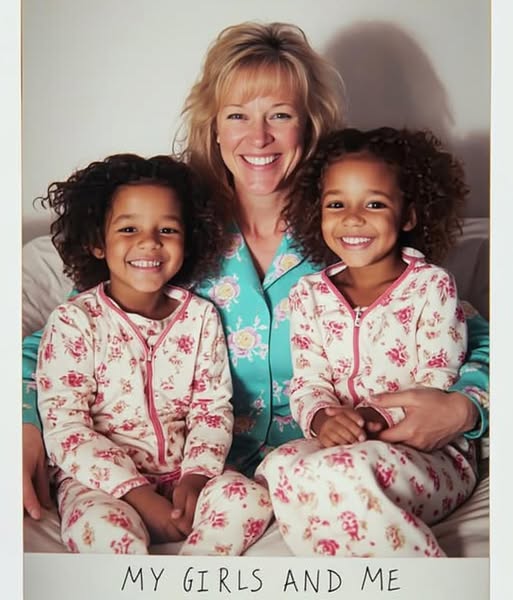Thirteen years ago, Elizabeth’s world collapsed in a single phone call. Her husband Michael had died in a car crash—but that wasn’t the only blow. The officer on the line gently explained that another woman had also perished in the accident, and two little girls—Michael’s twin daughters—had survived. Three years old, unknown to Elizabeth until that morning. The life she thought she had, the marriage she believed in, vanished in seconds.
She’d spent a decade loving a man who led a double life. While she endured fertility treatments and mourned miscarriages, he had built another family behind her back. The betrayal ran deep, but when Elizabeth saw those little girls—frightened, clinging to each other at his funeral, no one else to care for them—she didn’t hesitate. Despite her grief, she stepped forward.
“I’ll take them,” she told the social worker, her voice steady despite the storm inside.
Friends and family thought she was crazy. Why raise the children of a man who’d lied so profoundly? But Elizabeth didn’t see them as reminders of pain. She saw innocence. She saw the possibility of healing—for them, and maybe even for herself.
Adopting Emma and Sophie wasn’t easy. The system was skeptical. The girls were traumatized. And Elizabeth was navigating her own heartbreak. In the beginning, the twins tiptoed around her, convinced they were temporary guests in a stranger’s home. They whispered at night, wondering when she’d decide to send them away.
But Elizabeth never wavered. She fed them, comforted them, celebrated their birthdays, and tucked them in every night. When money was tight, she made mac and cheese feel like a treat. She learned their favorite songs, read them bedtime stories, and loved them with everything she had.
As they grew older, she knew she had to tell them the truth. Sitting them down, she explained their past—the accident, the betrayal, the complicated path that led them to her doorstep. She was honest, gentle, but nothing could prepare her for their reaction.
They were furious.
To them, it felt like their entire life had been a lie. Their biological father was a cheater. Their mother had died in an affair. And Elizabeth? She was the woman who raised them not because she had to—but because she couldn’t have her own children.
“You just took us in because you were lonely,” Sophie snapped.
Emma cried, accusing her of pity, not love.
The next years were hard. Teenagers are hard. The girls pushed boundaries, lashed out, and said cruel things. But Elizabeth stayed. No matter how deeply their words cut, she never stopped showing up.
Then, just after their sixteenth birthday, she came home to find herself locked out. A cold note taped to the door read: “We’re adults now. We need space. Go live with Grandma.”
Her suitcase sat on the porch.
She stood there for an hour, heartbroken and confused, before driving to her mother’s. For a week, there was silence. Her phone buzzed with messages—but never from them.
She second-guessed everything. Had she made a mistake? Were they right? Had they ever truly loved her, or was she always just a placeholder?
Then, on the seventh day, the call came.
“Mom?” Emma’s voice was soft. “Can you come home?”
Elizabeth raced back, unsure of what to expect. But the moment she stepped through the door, her breath caught.
The house had been cleaned, painted, and decorated with care. A surprise.
From the kitchen, the twins appeared, wide grins on their faces. “Happy late birthday!” they cried. “We’ve been planning this for months. Working after school, saving every penny.”
They had created a home office for her—lavender walls, new curtains, a framed photo of the three of them from adoption day.
“I’m sorry,” Sophie said. “We had to lie about locking you out. We wanted it to be perfect.”
“You gave us a home when we had nothing,” Emma whispered, tears in her eyes. “We didn’t know how to say thank you. So we showed you.”
In that moment, Elizabeth felt everything fall back into place. The pain. The doubt. The years of worry—all worth it.
She held them close, her voice choked with emotion.
“You were never a burden. Never a consolation. You’ve always been my daughters. And I will always be your mother.”
And they knew it—because love, real love, isn’t always born from blood. Sometimes, it’s forged through heartbreak, rebuilt through time, and proven with every choice to stay.
